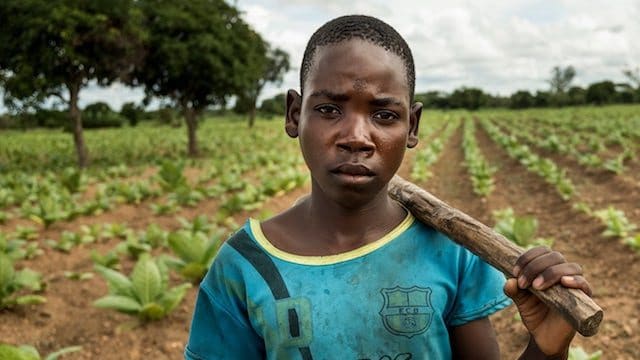Cigarettes sold in the US, Europe, and other parts of the world likely contain tobacco that was produced through child labor according to a major investigation by The Guardian.
Global multi-billion dollar cigarette brands claim to be tackling the issue, but evidence from tobacco plantations in Malawi, Indonesia, and Mexico reveal that children — some under 14 — are kept out of school to work as unpaid laborers in the farms.
The consequences of child labor are lifelong. “I wanted to be a nurse,” said one 14-year-old girl in Malawi, who spends her days weeding under the hot sun.
The Guardian reports:
Families see no option but to use their children in the fields as unpaid labour. Many are in debt to landowners and landlords and have to stay on from one season to the next, unable to break the cycle of deprivation.
“No effective actions have been taken to reverse this scenario,” said Vera Da Costa e Silva, head of the secretariat of the World Health Organization’s Framework Convention on Tobacco Control, a key body tackling an industry that kills more than 7 million people a year. “What happens is that tobacco farming gives its profits to the industry but gives very low incomes to the tobacco growers themselves.”
The tobacco firms say they are doing everything they can to end exploitative child labour.
But it is a scandal for which the multinational companies have a direct responsibility, she said. “There is a double burden – the burden of child labour itself and the burden of working on a deadly product that ultimately affects the children themselves.”
Notably, BAT and JTI tobacco firms argue that light work in the fields that does not affect health or education is acceptable for 13-15 year olds. Yet campaigners believe that children show not be anywhere near tobacco before they are 18.
The Guardian spoke with one 14-year-old girl in Lombok, Indonesia who says she has chest health problems due to working on tobacco farms.
Four major tobacco-leaf buying companies — BAT, Imperial Tobacco, PMI, and Japan Tobacco International — all say that they take child labor seriously. These companies fulfil orders from cigarette manufacturers including British American Tobacco, Philip Morris and Japan Tobacco.
BAT told The Guardian, “We do not employ children in any of our operations worldwide and make it clear to all of our contracted farmers and suppliers that exploitative child labour will not be tolerated.”
JTI, in contrast, emphasized that child labor is endemic to agriculture but that the company was doing its best.
“The reality is that child labor stems from a combination of social, economic and regulatory causes. At JTI, we don’t pretend to be able to solve the problem of child labor on our own, but we are doing our utmost to play our part in solving the problem, working with others.”







Freedom United is interested in hearing from our community and welcomes relevant, informed comments, advice, and insights that advance the conversation around our campaigns and advocacy. We value inclusivity and respect within our community. To be approved, your comments should be civil.